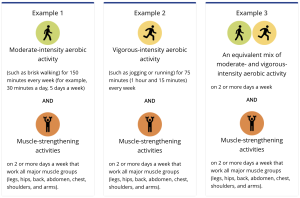Most of us will face an orthopaedic problem at some point in our lifetime. In fact, more than 1 in 2 adult Americans (126.6 million) has a musculoskeletal condition right now, according to a report by the United States Bone Initiative. Whether it be related to a sports injury or another condition, orthopaedic problems can leave us in pain and impact our mobility. They can even negatively affect our overall health and well-being. That’s why it’s so important to make our orthopaedic health a priority.
Follow these tips to take charge of your orthopaedic health and help keep you active and pain-free:
 Maintain a healthy weight.
Maintain a healthy weight.
According to a post by Harvard Health Publishing and Harvard Medical School, when you walk across level ground, the force on your knees is the equivalent of 1½ times your body weight. So, that means the more you weigh, the pressure you’re putting on your bones and joints increases exponentially. Furthermore, being overweight increases your risk for osteoarthritis (the most common form of arthritis that causes joint pain and stiffness) in two ways:
- The extra weight places added stress on weight-bearing joints like your knees, hips, and ankles.
- Weight gain can also cause inflammation, which may spread to other areas of the body.
Remember, change doesn’t happen overnight. Start small by adding a 10-minute walk to your day and reducing your daily calorie intake by 100 or so calories. Then, progress incrementally.
Stay active.
The Centers for Disease Control and Prevention (CDC) recommends adults should get 150 minutes of moderate-intensity physical activity (or 75 minutes of vigorous aerobic activity) and muscle-strengthening activity on 2 days per week. This may sound like a lot, but it doesn’t have to be all at once. You can spread the exercise time out during the week and break it up into smaller, more manageable chunks. For more information on the recommended levels of activity, check out the following options provided by the CDC.
Don’t know where to start? Walking just 30 minutes a day can not only strengthen your bones, joints, and muscles, it can help increase your cardiovascular fitness and reduce excess body fat.

Warm up and cool down.
Warming up before exercise is crucial for protecting your joints and ligaments and reducing your risk of injury. A good warm-up should last about 5 to 10 minutes and involve all major muscle groups. For example, you may start with 3 to 5 minutes of jumping jacks followed by 3 to 5 minutes of lunges. Or you could simply walk in place while gently swinging your arms.
That said, the cool-down portion of an exercise is just as important as the warm-up. After your workout, try to spend 5 to 10 minutes cooling down through a series of slow movements. An effective cool-down includes stretches to relax and lengthen muscles and improve your range of motion. Remember, the longer you can hold a stretch, the more you can improve your flexibility. However, don’t push it too hard when stretching. Though the stretch may be uncomfortable at the end of your range of motion, it should never be painful.
 Make nutrition a priority.
Make nutrition a priority.
Proper nutrition not only helps with maintaining a healthy weight, but it is also critical for good orthopaedic health. First, make sure to include foods in your diet that are rich in the following vitamins and minerals to ensure healthy bones and joints:
- Calcium. Foods rich in calcium include milk, cheese, yogurt, broccoli, spinach, kale, salmon, oranges, and almonds.
- Vitamin D. Examples include eggs and vitamin D-enriched milk. If you’re vegan, try a fortified plant-based milk or orange juice.
- Magnesium. Foods high in magnesium include whole wheat bread or pasta, flax and sesame seeds, broccoli, spinach, kale, bananas, avocado, kiwi, and yogurt.
- Vitamin B12. To add more B12 to your diet, try eating more fish, eggs, poultry, yogurt, milk, and cheese. If you’re vegan, try nutritional yeast, which is often fortified with B12
- Iron. Iron can often be found in meats such as pork, fish, shellfish, red meat, and poultry, as well as foods like spinach, broccoli, kale, beans, eggs, whole grains, and soy.
In addition to eating foods that are high in vitamins and minerals, be sure to incorporate plenty of anti-inflammatory foods into your diet. According to Harvard Health Publishing and Harvard University, some examples include tomatoes, olive oil, green leafy vegetables, almonds, walnuts, fatty fish like salmon and tuna, and fruits such as strawberries, blueberries, cherries, and oranges. Also, be sure to stay away from foods that can cause inflammation, such as refined carbs, fried foods, soda, and processed meats.
Dress with your orthopaedic health in mind.
When it comes to your orthopaedic health, be sure to dress for comfort and function. For example, wearing high heels throughout the day for long periods of time can place added stress and pressure on your body. This can often take a toll on your knees, hips, lower back, and Achilles tendons. So, try swapping out those heels or uncomfortable shoes for orthopaedic-approved kicks.
Remember, being conscious of your orthopaedic health doesn’t mean you have to sacrifice style. Thankfully, there are now several fashion-forward, expert-approved shoes available on the market. For example, Health.com outlined their top 10 stylish yet ortho-friendly shoes in a recent post.
Partner with an orthopaedic specialist.
Sometimes, making big life changes can be difficult. So, if you want to improve your orthopaedic health but aren’t sure where to start, schedule an appointment with an orthopaedic expert. They can work with you to develop a specialized plan that fits your individual situation and goals.
Advanced Ortho & Spine can help.
Need help making your orthopaedic health a priority? At Advanced Ortho & Spine (AOS) we can work with you to create an orthopaedic care plan that fits your individual needs and situation. Additionally, we specialize in caring for patients with full range of orthopaedic injuries and conditions. In fact, most are able to get back to living their best lives with only conservative treatment, like physical therapy. Schedule an appointment by calling 615.885.0200 or request an appointment online today.
 Dr. Christopher Cook is a Board-Certified Orthopaedic Surgeon and Sports Medicine & Joint Replacement Specialist at Advanced Ortho and Spine. He provides a full spectrum of Joint Replacement, Sports Medicine, and Shoulder & Upper Extremity services. Contact us today for more information or to request an appointment.
Dr. Christopher Cook is a Board-Certified Orthopaedic Surgeon and Sports Medicine & Joint Replacement Specialist at Advanced Ortho and Spine. He provides a full spectrum of Joint Replacement, Sports Medicine, and Shoulder & Upper Extremity services. Contact us today for more information or to request an appointment.

James Eby, MD, is a board-certified physiatrist, who specializes in nonoperative spinal procedures at Advanced Ortho & Spine. He provides a full spectrum of Physical Medicine treatments. Contact us today for more information or to request an appointment.
 Dr. Tarek Elalayli is a board-certified orthopaedic spine surgeon, who specializes in treating a full range of spinal conditions. Contact us today for more information or to request an appointment.
Dr. Tarek Elalayli is a board-certified orthopaedic spine surgeon, who specializes in treating a full range of spinal conditions. Contact us today for more information or to request an appointment.
 Dr. Erik Maryniw is a Board-Certified Hand and Upper Extremity Orthopaedic Surgeon at Advanced Ortho and Spine. He provides a full spectrum of Orthopaedic care and Microvascular Surgery from the hand to the shoulder. Contact us today for more information or to request an appointment.
Dr. Erik Maryniw is a Board-Certified Hand and Upper Extremity Orthopaedic Surgeon at Advanced Ortho and Spine. He provides a full spectrum of Orthopaedic care and Microvascular Surgery from the hand to the shoulder. Contact us today for more information or to request an appointment.
 Mitul Patel, MD is a board-certified orthopaedic spine surgeon, who specializes in treating a full range of spinal conditions. Contact us today for more information or to request an appointment.
Mitul Patel, MD is a board-certified orthopaedic spine surgeon, who specializes in treating a full range of spinal conditions. Contact us today for more information or to request an appointment.
 Dr. Lee Swiderek is a Fellowship-Trained Orthopedic Surgeon & Joint Replacement Specialist at Advanced Ortho and Spine. He provides a full spectrum of Joint Replacement and Complex Hip and Knee Reconstruction services. Contact us today for more information or to request an appointment.
Dr. Lee Swiderek is a Fellowship-Trained Orthopedic Surgeon & Joint Replacement Specialist at Advanced Ortho and Spine. He provides a full spectrum of Joint Replacement and Complex Hip and Knee Reconstruction services. Contact us today for more information or to request an appointment.
 Dr. Daniel Hagaman is a Fellowship-Trained Orthopaedic Surgeon & Sports Medicine Specialist at Advanced Ortho and Spine. He specializes in a range of orthopaedic conditions and treatments including Knee Arthroscopy, Knee Ligament & Cartilage Repair, Shoulder Arthroscopy, Hip Arthroscopy, Orthobiologistics, and more. Contact us today for more information and to request an appointment.
Dr. Daniel Hagaman is a Fellowship-Trained Orthopaedic Surgeon & Sports Medicine Specialist at Advanced Ortho and Spine. He specializes in a range of orthopaedic conditions and treatments including Knee Arthroscopy, Knee Ligament & Cartilage Repair, Shoulder Arthroscopy, Hip Arthroscopy, Orthobiologistics, and more. Contact us today for more information and to request an appointment.

With two locations near Nashville in Mt. Juliet and Hermitage, Advanced Ortho and Spine provides patients with high-quality, personalized care while advancing orthopaedic excellence. Contact us today to learn more or to schedule your appointment.
Disclaimer: This blog provides general information and discussions about health and related subjects. The information and other content provided in this blog, or in any linked materials, are not intended and should not be construed as medical advice, nor is the information a substitute for professional medical expertise or treatment.If you or any other person has a medical concern, you should consult with your healthcare provider or seek other professional medical treatment. Never disregard professional medical advice or delay in seeking it because of something read on this blog or in any linked materials. If you think you may have a medical emergency, call your doctor or emergency services immediately.
The opinions and views expressed on this blog and website have no relation to those of any academic, hospital, health practice, or other institution.

